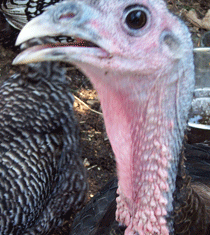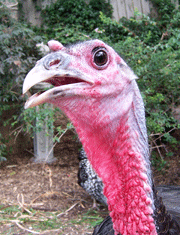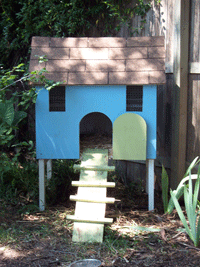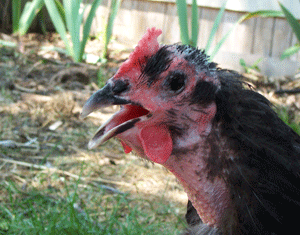Tales from the Happy Hen Farm
Welcome to the Happy Hen Farm "blog". We were on hiatus for a bit but now we're back baby! If you would like to receive periodic monthly updates you can subscribe to our newsletter by sending your email address to subscribe@happyhenfarm.org. Of course we will keep your address private and will never send or share it with anyone else.
Happy Hen Farm at the Trinity River Audubon Center
October 18, 2008
Happy Hen Farm had a booth at the grand opening of the Trinity River Audubon Center in Dallas, Texas. Big Red and Stubby were on hand today to help demonstrate the joys of backyard chickens. They were extremely patient as the many children and adults petted and cooed over them. To help ease the burden we will be taking Violet in addition for the Sunday showing. Lara gave a short presentation on Urban Chickens that was well received and will be repeating it on Sunday. Once we get settled after this busy week of preparation and attending the opening we will post her presentation, photos and a more complete story of the weekend.
The Audubon Center is a beautiful facility. If you have time tomorrow you should join us at the opening, otherwise check it out sometime soon!
John Talbert of Sabine Creek Honey Farm in the news.
August 8, 2006
John Talbert, the owner of Sabine Creek Honey Farm, bee instructor and all-around nice guy was featured in the Greenville Herald Banner (August 7th edition). I enjoyed the description of a bee as one of Texas' smallest livestock.
-- Matthew
Pasture Raised Beef.
July 26, 2006
This year we focused our summertime reading around a study of modern American food production. The Omnivore's Dilemma by Michael Pollan, Organic, Inc. by Sam Fromartz and The Way We Eat: Why Our Food Choices Matter by Peter Singer povided a lots to think about.
One issue that particularly resonated with us has to do with the production of meat in the United States. We keep our chickens as pampered pets and for the eggs they produce, but being around them has heightened our awareness of the meat we eat, and by extension the lives that are taken by eating that meat. Even though we eat a minimal amount of meat as it is, we are not planning to become vegetarian. However, descriptions of modern factory farms and slaughter operations make a strong case for seeking meat raised and slaughtered in a more humane manner (even though Peter Singer, a dedicated vegan would disagree with that). As we were mulling this over lo and behold we stumbled upon a local butcher shop dedicated to selling only pasture raised animals -- Burgundy Pasture Beef. If you live in the Dallas / Fort Worth area by all means check it out. They offer home delivery and nice people.
Some people approach pasture raised meat from the nutritional point of view and are concerned only with the potential health benefits associated with eating animals raised in this manner. For us the attraction is linked to animal welfare. Even though an animal dies to fill our belly we want to know that before slaughter they lived a life as close as possible not only to what nature intended for a domesticated animal, but to what compassion and conscience tells is is the right way for an animal to live. This decision ends up costing us more, but we feel better (though not totally absolved from sentimental feelings) knowing that the chickens we eat are allowed to scratch outdoors and not packed into commercial broiler operations, cows are not held in huge feedlots with no shade or shelter and with manure up to their ankles as they are fed things their bodies were never designed to eat and are pumped with antibiotics to deal with the consequences, and pigs are allowed to root outdoors and don't have their tails docked.
-- Lara
Blackie passes on.
July 17, 2006
It is with much regret that we inform you that Blackie has passed on to the great flock in the sky. When we opened her coop this morning she lay there still. We don't know if it was the heat (she had plenty of water and the run of the yard), lingering problems from her attacks earlier this month, or maybe she ate something that was not good for her.
We will miss her running to the back door when we came out, the little clucks from under the rosebushes and the way she would look you in the eye.
-- Matthew
Honey Time!
July 14, 2006
Today was honey harvest day.
We began early in the morning by swapping the top shallow super we had put on earlier in the week with the filled super, placing the bee escape board between them. This board allows the bees to leave the super but not re-enter, the goal being to have all the bees out of the honey super so we could easily extract the honey. This being our first time using this technique we were not quite sure how it would work. The books indicated that it could take 2 - 24 hours for the bees to completely vacate. However once the bees left there would be no one in there cooling the frames and with temperatures around 100° we ran the risk of having the beeswax melt and the honey ooze out.
After 4 hours, we decided to go into a hive. We suited up, lit the smoker and pulled the honey super off. It was heavy! I weighed one of the filled frames and it came in at around 8 lbs. With 9 frames per super and throwing in the weight of the super itself, we estimate that the whole box was about 75 lbs. Lifting this off the top of the hive, with bees a buzzing, while wearing a balky bee suit and sweating profusely was quite the experience. We moved it over to the driveway to check it out. There were still a good quantity of bees on the frames, so we took them out one-by-one, brushed the bees off and took the bee free frames into the house. This is a method we can use since are hives are at home and there are only two of them. Brushing off a frame at a time would definitely not work on a large scale.
The night before we had washed all of the equipment, including two trays that Lara had purchased at Sam's Club. These are the deep trays/basins that are used in restaurants to bus tables. They worked perfectly! They were the exact size to hold 9 frames comfortably.
With the frames in the house Lara began slicing the tops of the capings off with the electric uncapping knife while I spun the honey in the extractor. We were a bit dismayed to find a few small hive beetles in the frames. While an infestation of these pests can ruin a hive, in talking to other beekeepers it is not unusual to find one or two. A healthy hive is not bothered by them.
It took several hours, but the first hive yielded 45 lbs of honey! We used up about half the jars we had bought, and we thought at the time we were buying far too many jars.
When we went to the next hive, it was several hours later and this time the vast majority of the bees were gone, so we were able to get the frames into the house much more quickly. This hive yielded about 40 lbs. of honey, but this does not include the honey that will be recovered from the uncapping tray.
Given the amount of work required to make one teaspoon of honey, I am left in awe at teh
-- Matthew
Eleanor turns red with envy.
July 1, 2006
Tonight Lara was sitting in the chicken yard watching the chickens. As is usual, she would pick up a hen, stroke her feathers for awhile, checking for any problems. Apparently Eleanor (our turkey) didn't like sharing the attention. We noticed that when Lara stroked Eleanor her wattle under the neck was pale. But as soon as Lara picked up a hen, Eleanor would become agitated and her wattle would turn bright red.


It was not possible to catch her exactly in the before and after states, but these pictures from the same night capture the behavior we saw. Contrary to popular opinion envy is not a green-eyed monster. It is a red-wattled turkey.
-- Matthew
Blackie is adjusting, we get some relief from the heat
May 28, 2006
The upper 90's weather with high humidity has (temporarily) been replaced with lower 90's and lower humidity. Still no rain in sight, but it is not as oppresive as it has been.
Blackie, our BOPO (Bottom Of the Pecking Order) chicken, seems to be adjusting to life outside the coop. She is gaining weight and her head feathers are coming in (as can be seen here).


She has her own loft coop and free run of the yard. (Though not as destructive as a whole flock, she has taken a few bites from the cucumbers.) She runs up to us when we go outside, keeps the dogs in their place and likes to hang out under the rose bushes. She is laying in her private coop now and at night can be found perched outside the main coop, waiting for us when we go out to close things up. We tuck her in for the night and all is well. Her head feathers are coming in, she is gaining weight and is overall a much perkier hen. At this point we're not quite sure what the long-term solution will be - time will tell.
-- Matthew
Double visits
May, 2006
Today one of our friends came over with her 3 children and of course we gave them the "grand tour". There is something special about watching children (in this case ages 4, 5 and 7) interact with the animals. As they went inside the hen yard there was an initial hesitancy, but gradually they realized that the hens and turkeys were not going to attack them in a barnyard version of "The Birds" and they opened up. Cautiously they touched the feathers, feed the birds scratch, went inside the coop to retrieve eggs, find feather "treasures" on the ground and all in all have a blast.
Next we showed them the beehives (from a safe distance) and the older girl began discussing all the beekeeping information she had learend in school. Being the height of the nectar flow there were many bees, both drones and worn out workers, on the ground. We picked one up and let them see it up close. Then we moveed on to the plants, showing them the various vegetables and even picking a carrot that we later shared. Moving on to the playset thye went to the spot that we've set up as a pretend kitchen and started cooking. It was quite a gratifying visit and reaffirms our desire to introduce those (children and adults) who may think food only comes in plastic from the grocery store to the roots of the food chain.
As they were leaving, another neighbor ran across the street with her daughter and a friend who was visiting. They wanted to see "the chickens" and so tour number 2 began. We live for this.
-- Matthew
How not to transplant flowers near a bee hive
Apr 2006
It was a sunny afternoon. I'm working on the fence for the chicken yard while Lara was working in the gardens. She wanted to transplant a flower that was sitting in front of the hives about one foot to the left. She decided not to "suit up" but rather to work quickly. Unfortunately she didn't work quickly enough and a few bees began to challenge her. Not to be beaten, she calls me over to help. It is a special kind of love that responds to the request, "Honey, would you come help me finish this planting since the bees are getting antsy?"
So off I went. The two of us were trying to fill the hole containing the plant when Lara jumped up. "I've been bitten," she shouted, "I'm have to move away from here!" Being the brave, manly man that I am, I repled, "Go on, I'll finish this." She moveed away and out of the corner of my eye I saw her running towards the house. At that time I felt a buzzing by my nose and then a sharp sting. I jumped up and started heading for the house myself. With another bee in hot pursuit I ran up and down the driveway trying to lose it. Unbeknownst to me Lara had had a similar experience, only she felt that the bee was in her shirt. Being in full view of a dozen or so second story windows, she had to suppress the primal urge to rip off her shirt. I finally lost the little buzzer so I ran into the house with gunk coming out of my nose slurring, "Ith bith me!" only to find that Lara, in the privacy of the house, had stripped to the waist and was nursing a sting on her arm. It's an image that I will take with me to the grave.
Yes folks, we are professionals. Do not attempt this on your own.
-- Matthew
First Fowl Fatality
1 Dec 2004
Although our dogs eventually learned to avoid the hens, such was not always the case. It was late in the morning and I had just returned form a short errand and was using the bathroom that faces out into our yard. Gazing out the window I saw hens flying and dogs running, Quickly finishing the task at hand, I ran to the back door and called to the dogs. Bouncing happily up to the door come Paco and Zippy with feathers in their mouths. Fearing the worst I locked them in the house and went outside. Oh the humanity (or is that henanity?). Scared hens were flapping around, cowering in corners, hiding in bushes. I collected them one by one and put them in the coop, checking for injuries. Everyone seemed shaken but fine. But then I did a beak count and came up one short.
Looking around the yard I heard a soft clucking sound from near a bush. I found her there, badly injured. Feeling like a hapless parent of a newborn that has come down with some malady I run into the house and pull out the yellow pages, looking for a "chicken vet". Oddly enough there was no category for that service so I just started calling vets that were close by and asking if they had anyone who could look at a chicken. It turns out that there are just 2 or 3 places in town that can handle them, and in most cases the "chicken" vet was only there certain days and certain hours of the week. Finally I found a place near where Lara works, so I called my neighbor, wrapped the chicken in a towel, placed her in a cat carrier and we rushed out to the vet.
We go into the office announcing we had the "chicken emergency". They took her back, while I started the checking in process. This particular hen had always been a bit surly and was not distinguished in any way so we had never named her. When they asked for her name, I just said "Chicken #1". I could have given her any number, but I figured the least I could do was make her the top of the pecking order.
After a few minutes a very sympathetic doctor came out and told me that her back had been broken and that the best course would be to put her down. I agreed. With all the empathy and quiet voices you'd think that they were informing me that a parent had died. But they were used to treating pet chickens whose owners were likely more emotionally attached to their chicken then we were to this one. They asked if we would like her cremated (for a $70 fee). I called Lara and she said no, but that we would take the chicken home for a proper burial. When I relayed the story to her mother, she informed me that she would be happy to perform a cremation for free on her charcoal grill. Mothers have a way of putting things into perspective.
Chicken #1 was put to rest in a private ceremony in the back of Lara's parents' house. The vet even sent a sympathy card.
Moral: Even if the coop door looks like it is locked, check it anyway!
-- Matthew
Lara's Moral: "Barking dogs and clucking hens, often come to no good ends."
The first egg
Dec 2004
Today started out like any ordinary day, but in the afternoon I went to the coop and there it was. Nestled in the straw was the Holy Grail, the fruition of all our work, the first egg. I excitedly picked it up and ran to the house to call Lara. Such was my enthusiasm that in opening the back door I dropped it and it fell to the ground. Knowing that all the king's horses and all the king's men had failed in the past, I just called the dogs who made short order of it. I then called Lara to tell her that there had been a first egg and that perhaps I should leave the collection of said eggs to others.
-- Matthew
Happy Mother's Day
May 2004
I have a weird wife. Really, I do. Some women expect jewelry for Mother's Day but my wife asks for chickens and a hen house. Happy to oblige, my dear.
-- Matthew

